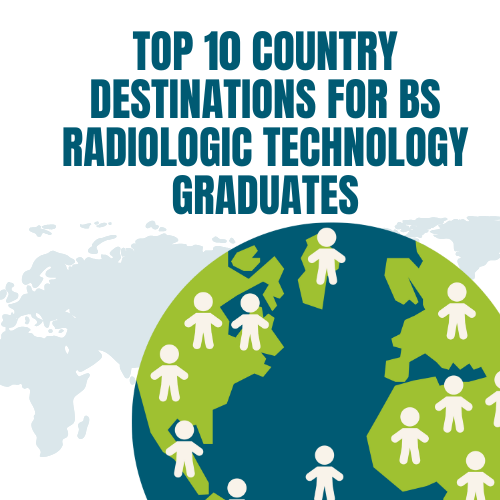For BS Radiologic Technology graduates seeking international careers, the United States, Canada, the UK, Australia, and New Zealand are strong options due to high demand and advanced healthcare systems. Other promising destinations include Ireland, the Netherlands, and certain countries in the Middle East like the UAE and Qatar, which are known to offer competitive salaries and opportunities for career growth.
Here’s a more detailed look at some of the top destinations:
1. United States
The United States boasts one of the most advanced and expansive healthcare systems in the world, making it a prime destination for radiologic technologists. There is a consistently high demand for skilled professionals, especially in metropolitan hospitals, diagnostic centers, and outpatient care facilities. Radiologic technologists in the U.S. benefit from access to cutting-edge medical technology, a wide range of specializations such as MRI, CT, and interventional radiology, and opportunities to pursue advanced certifications or higher education. Additionally, the U.S. offers competitive salaries, strong professional support networks, and pathways for career advancement, making it an attractive choice for those seeking long-term growth in the field.
2. Canada
Canada offers a robust and publicly funded healthcare system that consistently seeks qualified healthcare professionals, including radiologic technologists. The demand for radiologic technologists is strong across the country, particularly in provinces such as Ontario, British Columbia, and Alberta, where growing populations and aging demographics drive the need for diagnostic imaging services. Canadian healthcare facilities are equipped with modern imaging technologies, and professionals in the field are highly respected and well-compensated. Opportunities exist not only in hospitals but also in private clinics, research institutions, and educational settings. In addition, Canada provides a supportive work environment, a strong emphasis on work-life balance, and clear pathways for career advancement through further specialization or leadership roles. The country’s welcoming immigration policies and high quality of life make it an appealing destination for international graduates in radiologic technology.
3. United Kingdom
The United Kingdom, particularly England, presents strong career opportunities for radiologic technologists through both its public healthcare system—the National Health Service (NHS)—and an expanding network of private healthcare providers. The NHS remains one of the largest employers in the world and consistently seeks qualified radiographers to meet the growing demand for diagnostic and therapeutic imaging services. Roles are available in hospitals, community clinics, and specialized imaging centers across the UK. To practice professionally, registration with the Health and Care Professions Council (HCPC) is mandatory, ensuring high standards of education and practice. Radiologic technologists in the UK can also pursue various specializations such as MRI, CT, ultrasound, and nuclear medicine, with opportunities for continued professional development and advancement. In addition, the UK offers structured career progression, competitive salaries, and access to international research and training programs, making it an attractive destination for those aiming to build a long-term career in medical imaging.
4. Australia
Australia is known for its excellent work-life balance, high standard of living, and strong, stable economy—factors that make it an appealing destination for radiologic technologists seeking both personal and professional fulfillment. The country’s well-developed healthcare system, which includes both public services through Medicare and a growing private sector, has a consistent demand for qualified radiologic technologists across urban centers and regional areas. Professionals in this field can work in hospitals, diagnostic imaging centers, and specialized clinics, with opportunities to specialize in areas such as CT, MRI, sonography, and interventional radiology. Registration with the Medical Radiation Practice Board of Australia (MRPBA) is required to practice, ensuring high professional standards. In addition to competitive salaries and excellent workplace conditions, Australia supports continuous professional development and offers pathways for permanent residency for skilled healthcare workers, making it a top choice for radiologic technologists worldwide.
5. New Zealand
New Zealand offers a high quality of life, stunning natural landscapes, and a supportive, well-structured healthcare system that makes it an attractive destination for radiologic technologists. Similar to Australia, the country has a dual public-private healthcare model and places a strong emphasis on accessible, patient-centered care. There is steady demand for qualified radiologic technologists—referred to locally as medical imaging technologists (MITs)—particularly in larger cities like Auckland, Wellington, and Christchurch, as well as in regional hospitals where staffing shortages are more common. To practice, professionals must be registered with the New Zealand Medical Radiation Technologists Board (MRTB), which ensures adherence to national standards of competency and ethics. Radiologic technologists in New Zealand can pursue specializations in modalities such as CT, MRI, ultrasound, and nuclear medicine. The country also offers competitive compensation, a positive work environment, and opportunities for continuing education and career advancement. Combined with its welcoming immigration policies and relaxed lifestyle, New Zealand is an excellent choice for those seeking a fulfilling career in medical imaging.
6. Ireland
Ireland presents promising opportunities for radiologic technologists, known locally as radiographers, especially in major cities like Dublin, Cork, and Galway where healthcare services are rapidly expanding to meet the needs of a growing and aging population. The country has a well-regarded public healthcare system (the Health Service Executive or HSE) alongside a strong network of private hospitals and diagnostic centers. To work legally as a radiographer in Ireland, professionals must register with CORU—the regulatory body that ensures adherence to national standards of education, ethics, and competence. Once registered, radiographers can access a wide range of roles in general radiography, as well as specialized areas such as CT, MRI, interventional radiology, and nuclear medicine. Ireland offers competitive salaries, generous leave policies, and opportunities for continuous professional development. Its strategic location within the European Union, English-speaking environment, and high standard of living make it a desirable destination for both EU and non-EU radiologic technologists seeking stable and rewarding careers.
7. Netherlands
The Netherlands boasts a highly advanced and efficient healthcare system that places a strong emphasis on innovation, medical imaging, and the integration of technology in patient care. This makes it an attractive destination for radiologic technologists, particularly those interested in research, development, and the use of cutting-edge imaging techniques. Dutch hospitals and diagnostic centers are well-equipped with the latest technologies, and there is a consistent demand for skilled imaging professionals, especially in urban hubs such as Amsterdam, Rotterdam, and Utrecht. To practice as a radiologic technologist in the Netherlands, international professionals typically need to have their qualifications recognized by the Dutch authorities and may need to demonstrate proficiency in the Dutch language, especially for roles in public healthcare settings. The country also offers opportunities for specialization in areas like interventional radiology, MRI, CT, and nuclear medicine, and supports ongoing professional education and training. With its strong work-life balance, collaborative healthcare environment, and openness to international talent, the Netherlands is an excellent choice for those seeking to combine clinical work with opportunities in research and innovation.
8. United Arab Emirates
The United Arab Emirates, particularly in major cities like Dubai and Abu Dhabi, has seen rapid growth in its healthcare sector, driven by significant government investment and a rising demand for high-quality medical services. Radiologic technologists are in high demand across both public hospitals and private medical centers, where advanced imaging technologies and state-of-the-art facilities are the norm. The UAE offers highly competitive, tax-free salaries, modern working environments, and a multicultural workforce, making it an appealing destination for healthcare professionals from around the world. Licensing through the appropriate health authority—such as the Dubai Health Authority (DHA) or the Department of Health – Abu Dhabi (DOH)—is required to practice. Professionals also benefit from opportunities to specialize in advanced imaging modalities and participate in ongoing training and development. Combined with luxurious living standards and world-class infrastructure, the UAE provides a dynamic and rewarding environment for radiologic technologists looking to advance their careers internationally.
9. Qatar
Qatar is rapidly emerging as a key hub for healthcare in the Middle East, thanks to significant government investment and a national focus on enhancing medical services in line with its National Vision 2030. This ongoing expansion of healthcare infrastructure has created strong demand for qualified radiologic technologists in both public institutions, such as Hamad Medical Corporation (HMC), and an increasing number of private hospitals and specialized clinics. Professionals in this field are needed to support advanced diagnostic imaging services, including MRI, CT, and interventional radiology. Radiologic technologists must obtain a license from the Qatar Council for Healthcare Practitioners (QCHP) to work legally in the country. Qatar offers attractive, tax-free salaries, housing and travel allowances, and access to modern, technologically advanced work environments. The country also promotes continuous professional development and education. With its high standard of living, strong expat community, and ongoing growth in the medical field, Qatar is an excellent destination for radiologic technologists seeking both career advancement and financial reward.
10. Germany
Germany is known for its world-class healthcare system, modern infrastructure, and strong commitment to medical research and innovation, making it an excellent destination for radiologic technologists looking to work in Europe. The country has a high demand for skilled healthcare professionals due to its aging population and growing focus on preventive and diagnostic care. Radiologic technologists, referred to as “Medizinisch-technische Radiologieassistenten (MTRA)”, are employed in a wide range of settings including public hospitals, university medical centers, private clinics, and research institutions. Opportunities exist across various imaging modalities such as X-ray, CT, MRI, and nuclear medicine, with the potential to specialize further with additional training. To practice, foreign-trained professionals must typically have their credentials recognized by German authorities and may be required to demonstrate proficiency in the German language (usually at least B2 level). Germany offers competitive salaries, robust employee benefits, and a high quality of life, along with access to Europe’s broader healthcare and academic networks. Its structured professional environment and emphasis on lifelong learning make it a solid and rewarding choice for radiologic technologists seeking long-term career growth in Europe.
South SEED-LPDH College provides a strong and supportive environment for aspiring radiologic technologists through its BS Radiologic Technology program. In partnership with Las Piñas Doctors Hospital, students receive hands-on clinical experience and direct exposure to real-world healthcare settings. By combining academic excellence, industry-relevant training, and personalized mentorship, South SEED-LPDH College prepares future radiologic technologists with the knowledge, technical skills, and patient-centered approach needed to excel in the dynamic field of medical imaging.














Leave a Reply